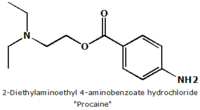Procaine
|
|
| 2-diethylaminoethyl 4-aminobenzoate hydrochloride | |
| CAS number 59-46-1 or 51-05-8 (with HCl) | ATC code C05AD05, N01BA02, S01HA05 |
| Chemical formula | C13H20N2O2·HCl |
| Molecular weight | 236.313 or 272.774 (with HCl) |
| Bioavailability | ? |
| Metabolism | ? |
| Elimination half-life | ? |
| Excretion | Renal |
| Pregnancy category | ? |
| Legal status | ? |
| Routes of administration | ? |
Procaine hydrochloride is a local anesthetic used primarily in dentistry. It is primarily known as novocaine, or by the trade name Novocain®.
Procaine was first synthesized in 1905, and was the first injectable man-made local anesthetic used. It was created by the German chemist Alfred Einhorn who gave the chemical the trade name Novocaine, from the Latin 'Novus' (meaning New) plus 'caine' as in "cocaine". It was introduced into medical use by surgeon Heinrich Braun.
Procaine is rarely used today since more effective (and hypoallergenic) alternatives such as lidocaine (xylocaine) exist. Prior to the discovery of procaine, cocaine was the most commonly used local anesthetic. Procaine (like cocaine) has the advantage of constricting blood vessels which reduces bleeding, unlike other local anesthetics like lidocaine; without the euphoric and addictive qualities of cocaine.
Procaine, an ester anesthetic, is metabolized in the plasma by the enzyme pseudocholinesterase through hydrolysis into para-aminobenzoic acid (PABA), which is then excreted by the kidneys into the urine. Allergic reactions to procaine are usually not in response to procaine itself, but to PABA. About 1 in 3000 people have an atypical form of pseudocholinesterase, which doesn't hydrolyze ester anesthetics such as procaine, resulting in a prolonged period of high levels of the anesthetic in the blood and increased toxicity.
Procaine is the primary ingredient in the controversial preparation Gerovital H3, which is claimed by its advocates to remedy many effects of aging. The mainstream medical view is that these claims were seriously studied and discredited in the 1960s.
External links
- What to do if novocain doesn't work (causes of incomplete anesthesia in dentistry) (http://www.dentalfearcentral.com/difficulty_numbing_dentist.html)
Template:Local anestheticsde:Novocain fr:Proca´ne nl:Novoca´ne

